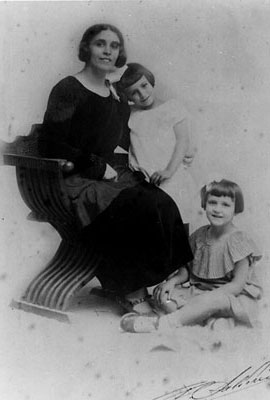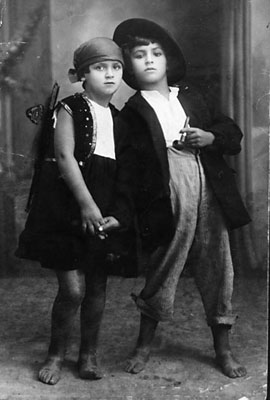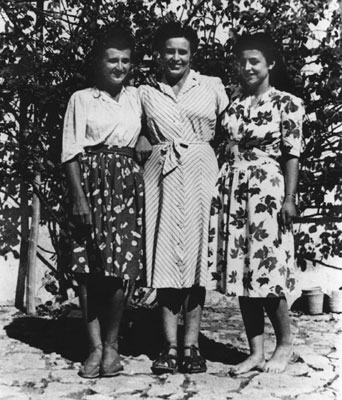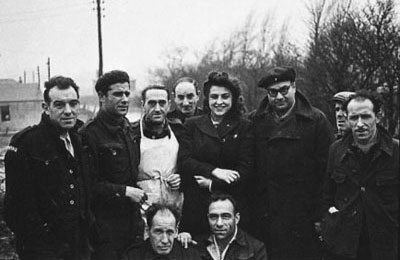|

November
19 was held in Reggio Emilia, a study day on Maria Luisa Berneri.
The act, organized from the archive Berneri-Chessa, has seen
these various scholars have shed light on different aspects of
life and work of the eldest daughter of Camillo Berneri and its
connections with the English anarchism. The variety of topics of
interest responds to the width of Maria Luisa: his best known
work is certainly Journey through Utopia, which publishes in
England in 1948 on behalf of George Woodcock, a journey through
the history of Utopias, starting from the Republic of Plato to
the present day, explores and contextualizes the various ideal
cities, making a division between authoritarian and
anti-authoritarian utopias. The theme of utopia can say
summarizing her interests in history, politics, philosophy, and
literature and the publication of the book places it in the
post-war British anarchist circle. Following in the footsteps of
his biography, the conference has shown its political awareness
and his work as editor of Press Freedom in the group 30-40 years.
|

|
|
Giovanna
Caleffi with the little
Maria Luisa Berneri (Arezzo, 1918)
|
 An exceptional experience
An exceptional experience
Maria Luisa was born in Arezzo in 1918, but soon the family
Berneri had to leave Italy to join his father Camillo, who had
illegally crossed the border to escape fascist persecution in
1926. By the age of eight years and then grew up and studied in
Paris: to grow in the French capital during the period between
the wars, the father often imprisoned and expelled, leading the
young Marie Louise (we often find Frenchified his name) an
interest in political science and social psychology, attending
courses at the Sorbonne. In 1937 the murder of his father in the
Spanish Civil War is a blow to the family oriented and definitely
Giovanna Caleffi and two daughters to politics, to bring forward
the ideas from his father. Thanks to Marie Louise of
correspondence and diaries of the mother, it was possible to
reconstruct and to emphasize the importance of border crossings,
the first in Italy and France in '26 and again in '37 to attend
the funeral of his father in Barcelona. It also underscores the
generational difference between the mother and daughters, born
between the two wars, a period when you accelerate the pace of
historical events. In fact, if Giovanna Caleffi feel the need to
bring ideas forward, correspondence and international contacts of
her husband after his death, his daughters since 1935, were
closer to politics.
And we have evidence of this interest in
the correspondence of Marie Louise with Vernon Richards, what
will be the companion of his life. Even Vernon (a name adopted in
England from Vero Recchioni) was the son of a famous Italian
anarchist Recchioni Emidio, who moved to London before the First
World War. In letters to Vernon we have evidence of the strong
interest of Marie Louise for pedagogy, convinced of the need to
direct efforts towards children and young people. "First the
people must be educated," she says in one of these letters
and expresses a desire to open a school, consider the fight as
the competition, insisting that when you see "that our
school is better, we will" . The interest in the pedagogy of
Berneri in this case is a desperate attempt against the
propaganda rampant at that time, an attempt to offer the
opportunity to grow in freedom
In 1937, after his father's
death, Maria Louisa joins her lover in London and settled
permanently in England. It can be noted how the multiple
transfers in foreign countries for Marie Louise constitute an
enrichment over that required emigration. The ease with which she
speaks and writes in several languages will allow you to
read the classics of anarchism in their original language and to
engage in translation, the various movements tend to help to
broaden their perspectives, to develop different points of view
and outline the situation European Union from different
perspectives. Maria Louisa collect his father's inheritance and
will continue intensely anti-fascist activity in England.
|

|

|
|
Giovanna
Caleffi with the two daughters,
Maria Luisa e Giliana
(Firenze, 1922)
|
The
two girls together at a costume
party in Camerino, in 1925
|
 antimilitarist campaign
antimilitarist campaign
It seems that in England, Spain and the World found a
favorable environment for the publication because of indignation
for the general policy of non-intervention given the obvious
Italian and German military interference in the Spanish
conflict.
The evolution of the name of the magazine is very
important to understand the gradual process of awareness of
international events: Spain and the World will become
Revolt! in the period between the Spanish War and the
beginning of World War II and later change the name again in a
much more resigned War Commentary.
The viewpoint of the
editors of Freedom Press is a challenge to the British state, as
the band takes a unique and consistent anarchist against the
state in relation to the war, to social order and international
democracy. Denounce that war is a "symptom" of the
state in all its implications, as Colin Ward says "War is an
expression of the state in its most perfect form: it is his
finest hour." Commentators anarchist Freedom Press strongly
discussed the position of the British government claiming to be
engaged in a war for democracy and international order. Carried
out a campaign highlighting the inconsistency of antiwar aspire
to peace with the sound of bombs (a theme that seems to refer to
current events ...) and even the sudden need of the British
government to intervene in defense of democracy against fascism
knowing well the non-intervention policy implemented during the
Spanish conflict in the thirties.
The Berneri is of particular
concern to the bombing of mass and how it justifies military
intervention in the media in Britain. The bombing of the Royal
Air Force until the armistice on Italy from October '42 and '43
aim to destroy the industrial areas and affect the morale of the
Italians. The British press says these interventions, accompanied
by propaganda, are intended to rebel against Italians Mussolini.
On War Commentary underlines how the British government invited
Italians to strike but then repressed British strikes. And it
reveals how the British media's promoted the cowardice and the
temperament of the Italians, not suitable for combat, to justify
the need to intervene.
The use of massive bombing, put into
practice for the first time in the Spanish conflict, involving
the whole population and leads to levels of destruction and death
ever known before. (Interestingly, the idea of the air war
is Italian: Giulio Douhet in 1921 published "The domain
of the air" in which he theorized the superiority of
those who control from the bombing). The violence used in large
scale in World War II, with totalitarianism, bombing and
concentration camps, disrupts the roots of Western civilization
and Western thought that mine was based so far on man and the
meaning of his existence. The combination of technical-violence
reaches its zenith with the nuclear explosion, the consequences
of which bring into question the belief that progress free man
from slavery.
Marie Louise in a collection of articles titled
"Neither East nor West" continues his father's
position "Neither Rome nor Moscow"; clearly
takes sides against totalitarianism, but also takes a stand
against democracy, stating "Why limit your choice to two
illnesses?". Consider that the Allies fought fascism
with its own means or with the terror and destruction, to
maintain control of the population and halt the democratization
of politics. He stressed that the bombing has affected mainly the
districts of workers and have achieved the goal of disrupting the
social fabric and avoid the creation of further revolutionary
movements.
In this case the bombs, of which are often accused
the anarchists, were used at will by democratic governments,
continuing to point out the anarchists as bearers of chaos and
disorder.
|

|

|
|
Maria
Luisa e Giliana, with the mother
Giovanna Caleffi (France,
beginning Thirties)
|
Maria
Luisa and Giliana, with their mother, in a photo
taken, in
exile, in the second half of the Thirties
|
 excellent reflections
excellent reflections
The conference was very interesting thanks to the excellent
historical and philosophical reflections Mariuccia Salvati, in
addition to open and close the act, she made the point of linking
various interventions, giving them a sense of cohesion. Charles
de Maria has reconstructed the biography of Maria Luisa through
the papers and has accompanied his presentation with the
screening of exciting photographs (see photo). The intervention
of Claudia Baldoli bombing and the press, which reveals
the strategy of the British government seemed very interesting
and significant that the cartoons has shown. Illuminating the
contribution (written) by Carissa Honeywell's use of emergency
powers to curb the democratization of politics and the analysis
of the conclusion of the Press Freedom Status = war.
And
Antonio Senta is the final reflection that allows you to expand
the horizon to the violence of World War II that disrupts Western
civilization.
The organization of the conference was made
possible thanks to the enthusiasm of exhaustive Flame
Chessa.
Maria Luisa Berneri died suddenly in 1949 at only 31
years due to emerging complications following childbirth. Leave
unfinished projects: the unpublished writings of Sacco and
Vanzetti, a translation of Bakunin, the publication of writings
and notes of his father, and a study of the revolutionary
tendencies of the Marquis de Sade.
 Valeria Giacomoni
Valeria Giacomoni
|

|

|
|
The
summer camp Maria Luisa Berneri (late
fifties –
beginning sixties)
|
Maria
Luisa Berneri with a group
of Spanish refugees in Charley
in 1945
|
|
Against War
"It is
perhaps unfair to say that the twentieth century is
experiencing the utopias of the past. A world that has
experienced two major wars in the short space of thirty
years, a world ravaged by epidemics and famine, can not be
compared with the utopias that proclaim to abolish poverty,
unemployment and even to establish a world government would
put an end to wars. But it is fair to say that large-scale
structure of the companies supported by past utopia has
become reality, and because the results have little
resemblance to what they had to wait there, you may be
justified in thinking that the structure is imperfect.
When
the twentieth century attempted to achieve the utopian
projects of the past, has failed miserably; States has
created all-powerful who control the means of production and
distribution, but which have not abolished the hungry; states
that encourage scientific research and develop production,
but they can not give every citizen a decent standard of
living; States who claimed to create the perfect equality,
but instead gave birth to new classes and the new
inequalities perhaps most horrible of previous states that
have turned people robots in taylorizzati, subject to the
machines of which they are serving, brutalized by the
propaganda states that have created conditions in which each
individual thought is regarded as criminal, in which
literature, music and art ceases to be an expression of
'individual and instead praise the regime where slavery to
the old religion is replaced by the State and its new gods. "
Viaggio attraverso Utopia,
Edizione a cura del Movimento Anarchico Italiano, Pistoia,
1981, pag. 357
"The
majority of utopias admits the war as an inevitable part of
their system, as indeed must be, since the existence of a
national state always gives rise to wars."
Berneri, M.L., Viaggio attraverso
Utopia, pag. 26
|
|